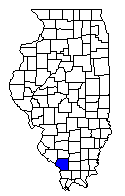
One of the successful and representative business men of Christopher,
Franklin county, Illinois, is John W. Dye, one of the pioneer settlers
of this place and now engaged in the flour milling business in
partnership with T. P. Harrison. He was formerly engaged in banking and
is indeed a man of varied interests, never having severed his connection
with the great basic industry and owning a small but valuable farm,
whose affairs he supervises. He is a native son of Franklin county and
has given this district the greatest proof of loyalty within his power
by choosing to make his permanent residence here. Mr. Dye's life story
began on August 24, 1866, in the western part of Six Mile township, his
parents being David and Nancy (Royal) Dye. The father was also a native
Illinoisan, his eyes having first opened to the light of day in Perry
county, in the year 1835. The mother was born in Jackson county,
Tennessee, in 1835. David Dye was a farmer by occupation and was a
veteran of the Civil war, having enlisted at the beginning of the war in
the One Hundred and Tenth Illinois Regiment and serving for three years
previous to being captured in Georgia and incarcerated for two months in
a southern prison, where he endured great hardships. He returned home
after his honorable discharge at the close of the great conflict and
there exchanged the musket for the plowshare. He remained upon his farm
for the remainder of his days, his demise occuring on July 30, 1894. In
politics he was a loyal adherent of the Republican party. David Dye was
a son of Reuben Dye, the latter a native of North Carolina, born in 1808
and coming to this state as early as 1830. This pioneer settled on a
farm in Perry county, but afterwards removed to Franklin county, where
he bought a farm and made it his home until summoned to the Great Beyond
in 1872. He was a Whig in politics and later, upon the formation of the
party, a Republican. The maternal grandfather of the immediate subject
of this review, James Royal, was born in Tennessee and came to Illinois
in 1850, his daughter Nancy being at that time a young girl. Mr. Royal
took up two hundred acres of land from the Government, paying for it at
the rate of twenty-five cents an acre, and on this property he lived out
the remainder of his life, witnessing in his day great development in
this part of the state.
John W. Dye received his education in the
district school and also had the advantage of one term at Benton, when
the schools at that place were under the enlightened direction of C. D.
Threlkeld, one of the principal educators in the record of Franklin
county. Mr. Dye began his career as a wage-earner as a teacher in the
district schools, for five years filling the office of country
pedagogue, with satisfaction to everybody concerned. He had absolutely
nothing with which to start and has been the architect of his own
fortunes, his success and present high standing being the logical result
of industry, ability and good judgment. Until 1906 he worked upon a
farm, but having saved a comfortable amount of money he decided to
establish himself upon a more independent footing and in 1908 he became
the proprietor of the flour mill in Christopher in partnership with T.
P. Harrison. The mill is conducted upon the most scientific principles
and the Messrs. Dye and Harrison supply for the most part the local
trade.
Mr. Dye was united in marriage in 1892 to Mary Rich,
daughter of Joel Rich, one of the early settlers of Franklin county, Mr.
Rich being a well-known farmer. The death of the first Mrs. Dye, an
estimable woman, occurred in 1897, and one child, a daughter Florence,
was left motherless. This daughter is now the wife of Ira Provert, who
is engaged in the hardware business in Christopher. Mr. Dye was a second
time married, in May, 1898, the lady to become his wife being Emma (Rea)
Snyder, daughter of Frank Rea, one of Franklin county's early settlers.
Mr. and Mrs. Dye are earnest and consistent members of the Baptist
church and the former is affiliated with the Modern Woodmen, in which he
has held the offices of consul and clerk. In politics he is a tried and
true Republican and he has been honored with public office, having held
the post of supervisor of Tyrone township. He owns stock in the First
National Bank of Christopher, in which for a year and a half he held the
office of cashier. He has resided in Christopher for thirteen years,
having arrived when it was a mere hamlet, and he is regarded as one of
its most public-spirited and valuable citizens.
Extracted from 1912 A History of Southern Illinois, by George W. Smith, volume 2, page 851.
Randolph |
Perry | Franklin |
Perry MO |
 |
Williamson |
| Union |


